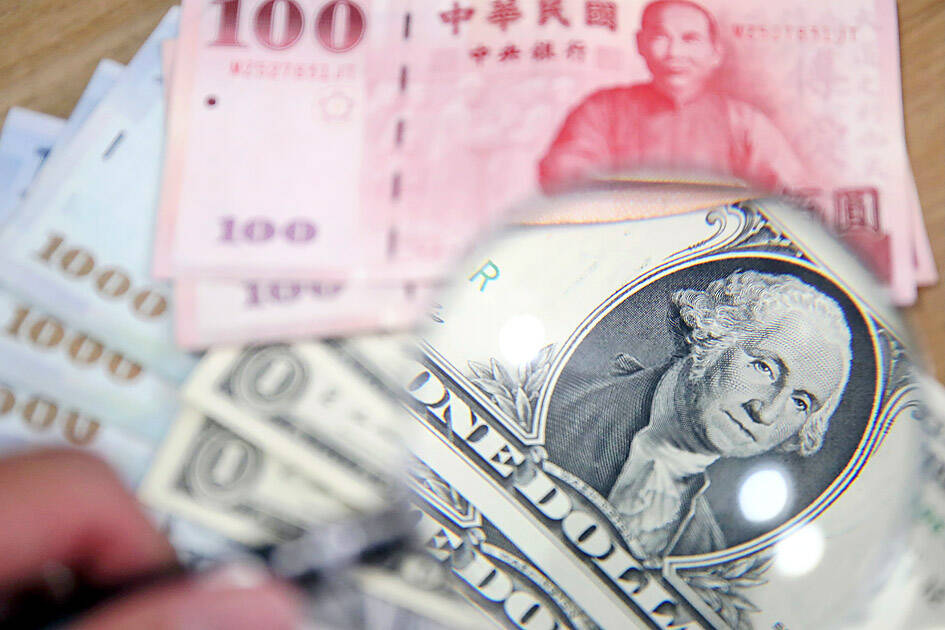The nation’s foreign exchange reserves last month posted their biggest decline in 12 years to an 18-month low of US$541.11 billion, as capital flight persisted and the central bank intervened to support the local currency, the central bank said yesterday.
“The decline in foreign exchange reserves came after major currencies weakened against the US dollar and the central bank sought to tame the local currency’s depreciation,” Department of Foreign Exchange Director-General Eugene Tsai (蔡炯民) told an online news conference.
The New Taiwan dollar last month shed 4.46 percent versus the greenback after the US Federal Reserve raised interest rates by 0.75 percentage points to rein in inflation.

Photo: CNA
Over the same period, the Australian dollar tumbled 5.74 percent, the British pound lost 5.1 percent and the yen softened 4.24 percent against the US dollar, Tsai said.
The central bank spent US$8.25 billion to support the NT dollar in the first six months of this year, with the volume expected to pick up in light of the local currency’s downward trajectory.
At the same time, drastic tightening by major central banks sent financial markets into wild swings, and the local bourse proved no exception, Tsai said.
Securities and saving deposits held by foreign portfolio managers stood at US$436.9 billion, equivalent to 81 percent of foreign exchange reserves — the lowest since July 2020, Tsai said.
The NT dollar fell the most in 25 years in the quarter ending on Sept. 30. It was the second-worst performance in Asia after the won, with global funds selling more than US$10 billion of Taiwanese stocks, Bloomberg data showed.
While the period saw Chinese threats toward Taiwan intensify, the outflows were mainly due to the US rate hikes, central bank Governor Yang Chin-long (楊金龍) said last month.
“Asian central banks might have to keep up their direct and indirect FX intervention to slow the depreciation of their currencies,” Bloomberg Intelligence said in a report this week.
Japan spent almost US$20 billion US dollars last month to prop up the yen. South Korea sold a net US$15.4 billion of US dollars in the three months through June.
If this month sees a fourth monthly decline in Taiwan’s foreign exchange reserves, that would be the longest fall since a four-month stretch in 2008, during the global financial crisis.
Additional reporting by Bloomberg

SEEKING CLARITY: Washington should not adopt measures that create uncertainties for ‘existing semiconductor investments,’ TSMC said referring to its US$165 billion in the US Taiwan Semiconductor Manufacturing Co (TSMC, 台積電) told the US that any future tariffs on Taiwanese semiconductors could reduce demand for chips and derail its pledge to increase its investment in Arizona. “New import restrictions could jeopardize current US leadership in the competitive technology industry and create uncertainties for many committed semiconductor capital projects in the US, including TSMC Arizona’s significant investment plan in Phoenix,” the chipmaker wrote in a letter to the US Department of Commerce. TSMC issued the warning in response to a solicitation for comments by the department on a possible tariff on semiconductor imports by US President Donald Trump’s

The government has launched a three-pronged strategy to attract local and international talent, aiming to position Taiwan as a new global hub following Nvidia Corp’s announcement that it has chosen Taipei as the site of its Taiwan headquarters. Nvidia cofounder and CEO Jensen Huang (黃仁勳) on Monday last week announced during his keynote speech at the Computex trade show in Taipei that the Nvidia Constellation, the company’s planned Taiwan headquarters, would be located in the Beitou-Shilin Technology Park (北投士林科技園區) in Taipei. Huang’s decision to establish a base in Taiwan is “primarily due to Taiwan’s talent pool and its strength in the semiconductor

An earnings report from semiconductor giant and artificial intelligence (AI) bellwether Nvidia Corp takes center stage for Wall Street this week, as stocks hit a speed bump of worries over US federal deficits driving up Treasury yields. US equities pulled back last week after a torrid rally, as investors turned their attention to tax and spending legislation poised to swell the US government’s US$36 trillion in debt. Long-dated US Treasury yields rose amid the fiscal worries, with the 30-year yield topping 5 percent and hitting its highest level since late 2023. Stocks were dealt another blow on Friday when US President Donald

UNCERTAINTY: Investors remain worried that trade negotiations with Washington could go poorly, given Trump’s inconsistency on tariffs in his second term, experts said The consumer confidence index this month fell for a ninth consecutive month to its lowest level in 13 months, as global trade uncertainties and tariff risks cloud Taiwan’s economic outlook, a survey released yesterday by National Central University found. The biggest decline came from the timing for stock investments, which plunged 11.82 points to 26.82, underscoring bleak investor confidence, it said. “Although the TAIEX reclaimed the 21,000-point mark after the US and China agreed to bury the hatchet for 90 days, investors remain worried that the situation would turn sour later,” said Dachrahn Wu (吳大任), director of the university’s Research Center for